英语口语(1)第7-9单元自学指导
英语口语自学教程

英语口语自学教程可以从以下几个方面入手:
1.音标发音:学习音标是提高英语口语的基础。
可以寻找一些专门的音标学习资源,如视频教程、在线课程等,学习每个音标的正确发音方式。
同时,可以尝试通过模仿来练习发音,比如跟读英文电影、听英文歌曲等。
2.单词发音:掌握单词的正确发音对于英语口语至关重要。
可以借助词典或在线资源,查询单词的音标和发音示例,并尝试跟读和模仿。
对于多音节单词,需要特别注意重音的位置。
3.句子发音:在掌握单词发音的基础上,需要练习整个句子的发音。
可以学习一些常见的英语句子结构,如简单句、复合句等,并尝试朗读和模仿。
同时,需要注意语调和节奏,英语中常见的语调有升调和降调,而节奏感则需要通过长期练习来掌握。
4.口语练习:口语练习是提高英语口语的关键。
需要大量地输入和输出,可以参加英语角、语言交换活动等,与母语为英语的人交流。
同时,也可以通过在线学习资源进行自我练习,如口语练习平台、社交媒体等。
5.长期坚持:提高英语口语需要长期的坚持和练习。
需要制定合理的学习计划,并持之以恒地执行。
在练习过程中,
需要不断反思和总结,找出自己的不足之处,并针对性地进行改进。
总之,自学英语口语需要耐心和毅力,需要制定合理的计划并坚持练习。
通过不断地学习和实践,相信你的英语口语水平会得到显著提高。
学英语口语如何入手-英语口语有哪些学习技巧

学英语口语如何入手-英语口语有哪些学习技巧学英语口语的入手步骤:第一步:掌握音标;第二步:夯实基础;第三步:养成英语思维习惯;第四步:锻炼听力培养语感。
如果想具体了解学英语口语如何入手,那无妨接着往下看吧!第一步:掌握音标首先,反复学习朗诵音标,感受每个音标的发音特点和区别,尤其是元音;单个音标可以准确读出之后,接下来就是读单词,学习辅音元音结合后的发音;最后就是句子的学习了,找一些简单的日常对话来朗诵。
建议大家将自己的朗诵录下来,回过头去听,找出读得不好的地方强化学习。
音标——单词——句子,这是个按部就班的过程,也是发音学习基本的步骤。
第二步:夯实基础虽说英语口语中并不过分拘泥语法,但口语句子的组织并不是杂乱无章的,词也不能过于为所欲为,所以打好英语基础还是很必要的。
优良的功底可以帮助你更正确地组织语句,丰富的词汇量可以使你的表达更灵活,口语常识和句子的累积可以让你说出更地道的英语。
所以很多初学者在学完音标之后,都会选择学习一些教材打基础。
新概念第一册就是不错的选择,它涵盖了比较基础的句式和日常对话,在学习知识的过程中可以积存常用的口语句子,夯实基础和学习口语两不误。
第三步:养成英语思维习惯相信大家对“中式英语〞不陌生,很多人在说英语的时候直接按照脑子里的汉语意思逐字翻译出来,这就是由于缺乏英语思维习惯造成的。
那么如何避免“中式英语〞呢?可以试试用英文写日记的方法,天天写几个句子,句式不一定要很复杂,能用符合英语的习惯表达出来就好。
此外还要开口说,或许一开始你说出的甚至不是一个完整句子,但是不要放弃,保持学习。
第四步:锻炼听力培养语感在英语口语中,“听〞是很重要的一部分。
只有听懂对方说什么,才干给出正确回应。
那么应该怎么听?初学阶段不用听太复杂、太难的材料,平常可以多听听英文歌,对照歌词唱一唱。
此外还可以看英文电影和美剧,有资源的话尽量看双语字幕的,边看边学习,看看生活中一些话是怎么用英语表达的。
新编大学英语口语教程1教学课件Unit 7

1 Part 1 Warm Up 2 Part 2 Read Aloud & Answer Questions 3 Part 3 Individual Presentation 4 Part 4 Pair Work 5 Part 5 Further Practice
Part 1 Warm Up
3) What do you expect to gain from your first job?
High salaries Work experience Self-confidence Communication skills Others (please specify)
Part 1 Warm Up
Part 2 Read Aloud & Answer Questions
Part 2 Read Aloud & Answer Questions
2 Answer the following questions. For each question, you will have 20 seconds to respond.
Question 3 Do you think earning many certificates improves job prospects for college students? Why or why not?
Part 2 Read Aloud & Answefollowing passage and read it aloud. You will have 45 seconds to go over the passage and one minute to read it aloud. Pay attention to the pronunciation of each word while reading.
怎样自学英语口语练习

怎样自学英语口语练习
自学英语口语是一项挑战,但通过以下步骤,你可以有效地提高你的口语能力:
1. 听力训练:首先,通过观看英语电影、电视剧、播客和TED演讲来提高你的听力理解能力。
这有助于你熟悉不同的口音和语速。
2. 模仿练习:选择一些你喜欢的英语片段,模仿发音和语调。
这不仅可以帮助你提高发音,还能让你更好地理解语言的节奏和语调。
3. 日常对话练习:尝试用英语进行日常对话。
可以从简单的自我介绍开始,然后逐渐增加话题的复杂性。
4. 使用语言学习应用:利用手机应用进行口语练习,许多应用都提供了与虚拟角色对话的机会,这有助于你练习实时反应。
5. 加入语言交换小组:寻找语言交换伙伴,与他们进行定期的口语练习。
这不仅可以提高你的口语能力,还能让你了解不同文化。
6. 朗读练习:选择一些英语文章或书籍,大声朗读。
这有助于提高你的发音和流利度。
7. 记录自己的声音:使用录音设备记录自己的英语口语,之后回听并分析自己的发音和语言使用,找出需要改进的地方。
8. 参与在线论坛和社交媒体群组:加入英语论坛和社交媒体群组,与他人进行交流和讨论。
9. 勇于犯错:不要害怕犯错。
在语言学习过程中,犯错是不可避免的,重要的是从错误中学习。
10. 持续练习:语言学习是一个持续的过程,每天都要练习,哪怕只
有几分钟。
记住,耐心和持续的努力是自学英语口语的关键。
通过不断的练习和
应用,你的口语能力将会得到显著的提高。
新课标英语七年级上册Unit7-9知识点
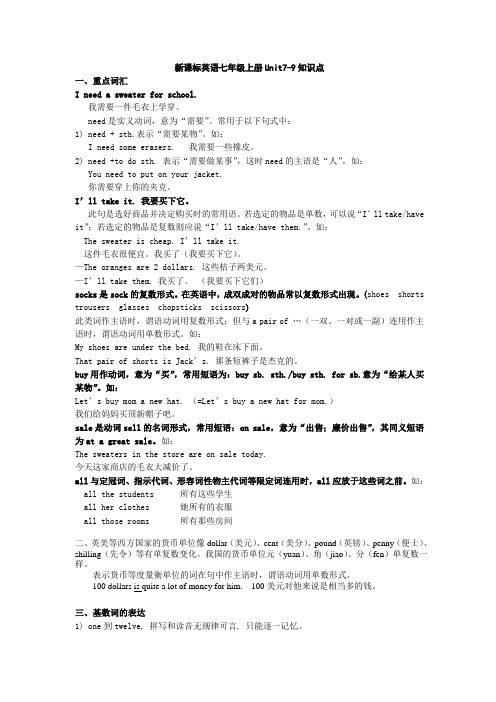
新课标英语七年级上册Unit7-9知识点一、重点词汇I need a sweater for school.我需要一件毛衣上学穿。
need是实义动词,意为“需要”。
常用于以下句式中:1) need + sth.表示“需要某物”。
如:I need some erasers. 我需要一些橡皮。
2) need +to do sth. 表示“需要做某事”,这时need的主语是“人”。
如:You need to put on your jacket.你需要穿上你的夹克。
I’ll take it. 我要买下它。
此句是选好商品并决定购买时的常用语。
若选定的物品是单数,可以说“I’ll take/have it”;若选定的物品是复数则应说“I’ll take/have them.”。
如:The sweater is cheap. I’ll take it.这件毛衣很便宜。
我买了(我要买下它)。
—The oranges are 2 dollars. 这些桔子两美元。
—I’ll take them. 我买了。
(我要买下它们)socks是sock的复数形式。
在英语中,成双成对的物品常以复数形式出现。
(shoes shorts trousers glasses chopsticks scissors)此类词作主语时,谓语动词用复数形式;但与a pair of …(一双、一对或一副)连用作主语时,谓语动词用单数形式。
如:My shoes are under the bed. 我的鞋在床下面。
That pair of shorts is Jack’s. 那条短裤子是杰克的。
buy用作动词,意为“买”,常用短语为:buy sb. sth./buy sth. for sb.意为“给某人买某物”。
如:Let’s buy mom a new hat. (=Let’s buy a new hat for mom.)我们给妈妈买顶新帽子吧。
如何自学英语口语的方法
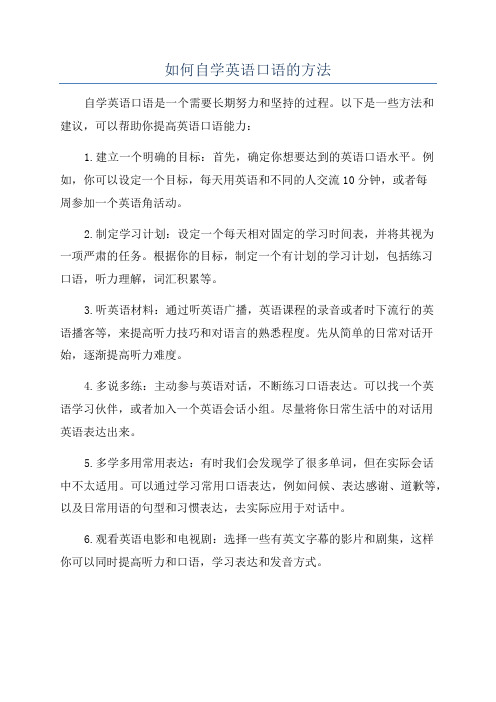
如何自学英语口语的方法自学英语口语是一个需要长期努力和坚持的过程。
以下是一些方法和建议,可以帮助你提高英语口语能力:1.建立一个明确的目标:首先,确定你想要达到的英语口语水平。
例如,你可以设定一个目标,每天用英语和不同的人交流10分钟,或者每周参加一个英语角活动。
2.制定学习计划:设定一个每天相对固定的学习时间表,并将其视为一项严肃的任务。
根据你的目标,制定一个有计划的学习计划,包括练习口语,听力理解,词汇积累等。
3.听英语材料:通过听英语广播,英语课程的录音或者时下流行的英语播客等,来提高听力技巧和对语言的熟悉程度。
先从简单的日常对话开始,逐渐提高听力难度。
4.多说多练:主动参与英语对话,不断练习口语表达。
可以找一个英语学习伙伴,或者加入一个英语会话小组。
尽量将你日常生活中的对话用英语表达出来。
5.多学多用常用表达:有时我们会发现学了很多单词,但在实际会话中不太适用。
可以通过学习常用口语表达,例如问候、表达感谢、道歉等,以及日常用语的句型和习惯表达,去实际应用于对话中。
6.观看英语电影和电视剧:选择一些有英文字幕的影片和剧集,这样你可以同时提高听力和口语,学习表达和发音方式。
7. 利用手机应用和网络资源:有很多英语学习应用和网站,例如Quizlet, Duolingo, BBC Learning English等,提供了各种练习和课程。
可以利用碎片时间进行操练。
8.模仿榜样:找到一个你喜欢的英语母语者,努力模仿他们的口音、语调和表达方式。
你可以观察他们的肢体语言和说话间的停顿,以及一些习惯表达方式。
9.克服害怕和困惑:很多人在刚开始学习英语口语时,害怕出错、担心被人笑话。
但只有勇敢地开口说,才能提高自己的口语能力。
当遇到困惑时,可以请教他人或者寻找相关资源进行澄清。
10.坚持与反馈:关键是保持学习英语口语的动力和积极性。
保持良好的学习习惯,每天都花时间学习和练习。
给自己设定一些小目标,并在达成后给予自己奖励,同时在学习过程中寻求反馈,不断完善和提高自己的口语能力。
奇妙小学英语口语一级复习四教学计划
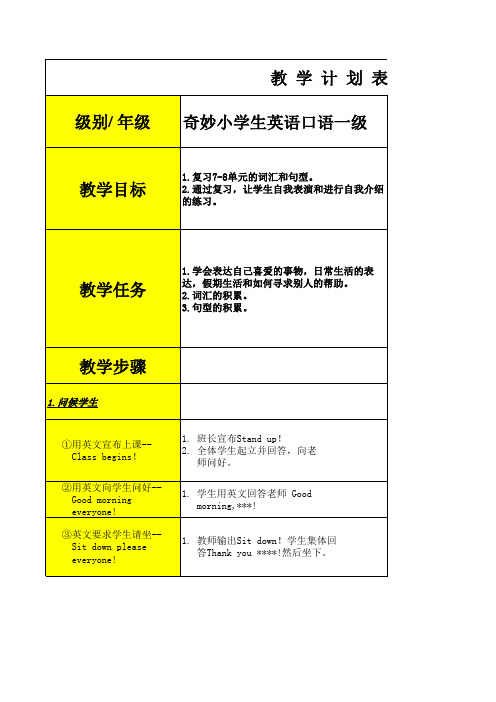
①用英文宣布上课-Class begins!
1. 班长宣布Stand up! 2. 全体学生起立并回答,向老 师问好。
②用英文向学生问好-Good morning everyone! ③英文要求学生请坐-Sit down please everyone! Warm-up Rabbit*2,red red eyes, oh shua*3, Rabbit*2,long long ears, oh a*3, Rabbit*2,short short tail, oh pia*3.
1、warm up的学习第一遍是老师先做学生观看 。 2、第二遍学生和教师一起做。 3、全体再做一遍,教师并做解释。 4、最后全班做比赛。
2.开始输入
1.教师先做自我介绍。 Hello. My name is Mike. I am six. I am a boy. I am tall. I'm in Class 1,Grade 2,in Garden School. My hair is brown. My eyes are brown. I'd like blue trousers. I'd like to eat ... I have been to... Let's go to... This is my photo. Thank you!
教 学 计 划 表 级别/ 年级 奇妙小学生英语口语一级
1.复习7-8单元的词汇和句型。 2.通过复习,让学生自我表演和进行自我介 绍的练习。
教学目标
教学任务
1.学会表达自己喜爱的事物,日常生活的表 达,假期生活和如何寻求别人的帮助。 2.词汇的积累。 3.句型的积累。
教学步骤
1.问候学生
1. 班长宣布Stand up! 2. 全体学生起立并回答,向老 师问好。 1. 学生用英文回答老师 Good morning,***!
英语口语怎么自学-学好的方法-怎样学好

英语口语怎么自学-学好的方法-怎样学好自学英语口语的方法有这些:1.学习听力,并模仿发音;2.天天进行朗诵;3.积存词汇量;4.多开口,多与外国人交谈。
如果想具体了解英语口语怎么自学,那无妨接着往下看吧!1、学习听力,并模仿发音想要自学英语口语和掌握口语学习的技巧,就必须学好听力。
想要学习听力,还必须强化口语,因此听和说这两方面是互补的。
在学习英语听力时,要注意仔细分辨外国人的发音,然后自己模仿他们的发音,这样听力水平就提升了。
与此同时,在不断地模仿和改正自己的发音中,我们的发音也会越来越地道。
2、保持天天朗诵朗诵关于学习英语口语还是有很大的好处的。
想要说得流畅,我们可以通过阅读来进行训练。
在天天早上起床后或晚上睡觉前抽出40多分钟大声朗诵,你会有一种酣畅淋漓的感觉。
随着时间的推移,你会发现自己的语感正在逐步加强。
但有一点要知道,在朗诵时应注意英语的一些发音规则,如连读、爆破和重读等。
3、积存词汇量在英语口语学习中,最重要的就是词汇量。
为了能够用英语进行交流,可能必须要掌握6000-7000个单词。
但要注意,掌握6000-7000个词汇不只是认得单词,更重要的是能够运用这些单词与外国人交流。
4、多开口,多与外国人交谈想要掌握地道的英语口语,那么有时间的话就多和老外用英语交谈。
我们可以通过与外国人的交谈来提升学习英语的信心。
假如没有机会和外国人交流,也可以通过一些线上平台找外国朋友一起学习英语对话。
2学好英语口语的方法有哪些1、中国人学英语,最常见的方法是背单词,还有人以能背出一本词典为荣,但是语言是活的,背单词只是一个很基础的方法,语言是必须要活学活用的,单纯背单词反而会让学英语难度加大。
实际上,单词没有多少实际运用的价值,关键在于语境,单词要学会在句子中使用,这样才干真正提升〔外语〕水平,一个句子除了单词之外,还包括了语境、语法、发音、内容,在句子中,才干更好的去理解单词。
2、学习英语最怕三心二意,不能保持,这样好容易培养出来的语感会很快的消逝,只有不停的去接触英语、使用英语,那大脑、耳朵都会慢慢的接受这种新的语言,同时培养好自己的英语思维。
新课标必背英语口语第一单元到第55单元
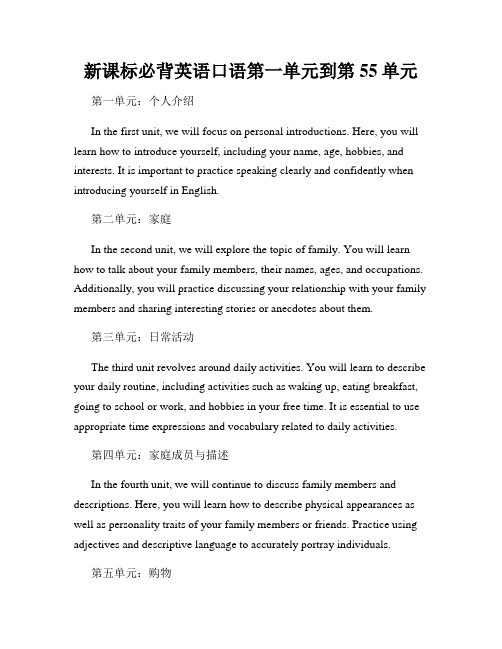
新课标必背英语口语第一单元到第55单元第一单元:个人介绍In the first unit, we will focus on personal introductions. Here, you will learn how to introduce yourself, including your name, age, hobbies, and interests. It is important to practice speaking clearly and confidently when introducing yourself in English.第二单元:家庭In the second unit, we will explore the topic of family. You will learn how to talk about your family members, their names, ages, and occupations. Additionally, you will practice discussing your relationship with your family members and sharing interesting stories or anecdotes about them.第三单元:日常活动The third unit revolves around daily activities. You will learn to describe your daily routine, including activities such as waking up, eating breakfast, going to school or work, and hobbies in your free time. It is essential to use appropriate time expressions and vocabulary related to daily activities.第四单元:家庭成员与描述In the fourth unit, we will continue to discuss family members and descriptions. Here, you will learn how to describe physical appearances as well as personality traits of your family members or friends. Practice using adjectives and descriptive language to accurately portray individuals.第五单元:购物Unit five focuses on shopping. You will learn vocabulary related to different types of stores, clothing, and accessories. Additionally, you will practice asking for help or assistance from salespeople and negotiating prices. This unit will help you navigate various shopping situations fluently in English.第六单元:旅行与交通The sixth unit explores the topic of travel and transportation. You will learn how to talk about different modes of transportation, such as planes, trains, and buses. Additionally, you will practice discussing your travel experiences, destinations, and making travel plans in English.第七单元:餐厅与点餐In unit seven, we will discuss restaurants and ordering food. You will learn vocabulary related to menus, food items, and commonly used phrases for ordering. Additionally, you will practice asking for recommendations and addressing any dietary restrictions or preferences.第八单元:学校与教育Unit eight focuses on the topic of school and education. Here, you will learn vocabulary related to different school subjects, classrooms, and educational experiences. You will also practice discussing your favorite subjects, teachers, and school activities.第九单元:时间与日期The ninth unit explores the concept of time and dates. You will learn how to talk about different times of the day, days of the week, months, andyears. Additionally, you will practice discussing schedules, appointments, and important events.第十单元:常用问答In unit ten, we will cover common questions and answers. You will learn how to respond to questions related to personal information, opinions, and preferences. This unit will help you to engage in conversations and provide thoughtful responses.依此类推,每个单元都按照相应的主题展开教学,以满足新课标英语口语考试的要求。
英语口语学习方法

英语口语学习方法英语口语学习方法无论在学习、工作或是生活中,大家只有不断学习才能不断进步,不过,学习不是死读书,而要讲究方法的。
那么,都有哪些实用的学习方法呢?以下是小编精心整理的英语口语学习方法,希望能够帮助到大家。
英语口语学习方法1多听、多说、多练:学习英语口语的基本原则是多听、多说、多练。
在学习和实践中,应该大量用英语说话,练习发音和语音语调,增加口语熟练度和流利度。
注重日常生活应用:英语口语主要是用于日常交流,因此,学生在学习、生活和工作中要注重口语的实用性。
通过模拟日常交流场景和对话,积极在生活中渗透英语语境。
学习语音和语调:英语口语中语音和语调对交流效果有着很大的影响。
因此,学生应该注重体验和分析英语语调和语音规律,基于科学原则进行逐步地发音演练,加强口腔肌肉的协同动作,从而提高口语的准确度和自信度。
练习和巩固听力:英语口语和听力密切相关,学生可以选择高质量的听力材料和辅助教学工具,以听力消化和提高口语的熟练度和流畅度。
寻找机会交流:英语口语是需要实践和实战的,因此,学生应该寻找不同场合与人交流的机会,并积极加入英语学习社区、英语角及其他学习交流平台,从而获取更多的口语练习和反馈。
总之,学习英语口语需要注重方法和系统化的学习,建立正确的`记忆体系和复习方法,并使用有效的学习工具和资源。
同时,在实际应用中注重策略,多练多用,巩固知识体系。
通过多方面的练习和学习,学生可以提高自己的英语口语水平,从而在与外国人交流和沟通时更加得心应手。
英语口语学习方法2方法一、寻找学伴一起练习口语.英语角是个不错的地方,在那我们不但可以练习口语,还可以交流英语学习经验,开拓视野,提高英语学习兴趣。
如果找不到学伴或参加英语角的机会很少,那么也没有关系,有很多种方法可以自己练习口语.比如通过自己对自己将英语来创造英语环境.可以对自己描述所看到的景物,英语口述自己正在作的事情.方法二、口译汉英对照(或英汉对照)的小说或其它读物这种英语口语学习方法非常有效且很容易坚持.首先我们先读汉语部分,然后逐句直接口译成英文,完成一小段后,去看书上的对应英文部分并与我们的口译进行比较,我们马上可以发现我们口译的错误,缺点和进步. 请注意:开始要选择较简单的读物,且应大量做,只做一两篇效果是不明显的开始可能较慢,费时较多,但请坚持,整体上这是一个加速的过程. 高级阶段请计时练习,以加快反应速度和口语流利度.作为成人学英语,记忆力差是个拦路虎,作复述练习或背诵课文往往力不从心,或者由于词汇量太小,觉得直接作口译太难,那么这样做可以非常有效地解决这个问题:先学习英文课文,通篇理解透彻后,再来看汉语译文, 把汉语译文口译回英文。
如何自学好英语口语
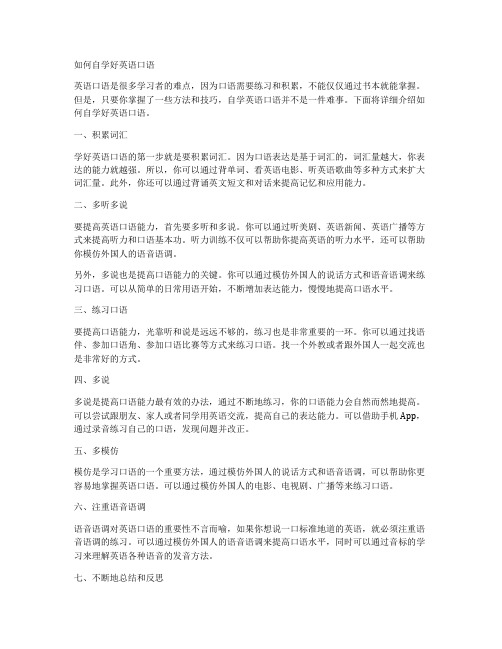
如何自学好英语口语英语口语是很多学习者的难点,因为口语需要练习和积累,不能仅仅通过书本就能掌握。
但是,只要你掌握了一些方法和技巧,自学英语口语并不是一件难事。
下面将详细介绍如何自学好英语口语。
一、积累词汇学好英语口语的第一步就是要积累词汇。
因为口语表达是基于词汇的,词汇量越大,你表达的能力就越强。
所以,你可以通过背单词、看英语电影、听英语歌曲等多种方式来扩大词汇量。
此外,你还可以通过背诵英文短文和对话来提高记忆和应用能力。
二、多听多说要提高英语口语能力,首先要多听和多说。
你可以通过听美剧、英语新闻、英语广播等方式来提高听力和口语基本功。
听力训练不仅可以帮助你提高英语的听力水平,还可以帮助你模仿外国人的语音语调。
另外,多说也是提高口语能力的关键。
你可以通过模仿外国人的说话方式和语音语调来练习口语。
可以从简单的日常用语开始,不断增加表达能力,慢慢地提高口语水平。
三、练习口语要提高口语能力,光靠听和说是远远不够的,练习也是非常重要的一环。
你可以通过找语伴、参加口语角、参加口语比赛等方式来练习口语。
找一个外教或者跟外国人一起交流也是非常好的方式。
四、多说多说是提高口语能力最有效的办法,通过不断地练习,你的口语能力会自然而然地提高。
可以尝试跟朋友、家人或者同学用英语交流,提高自己的表达能力。
可以借助手机App,通过录音练习自己的口语,发现问题并改正。
五、多模仿模仿是学习口语的一个重要方法,通过模仿外国人的说话方式和语音语调,可以帮助你更容易地掌握英语口语。
可以通过模仿外国人的电影、电视剧、广播等来练习口语。
六、注重语音语调语音语调对英语口语的重要性不言而喻,如果你想说一口标准地道的英语,就必须注重语音语调的练习。
可以通过模仿外国人的语音语调来提高口语水平,同时可以通过音标的学习来理解英语各种语音的发音方法。
七、不断地总结和反思在学习口语的过程中,你要保持不断地总结和反思。
在交流的过程中,不断地发现问题,及时进行改正。
英语口语(1)第7-9单元自学指导
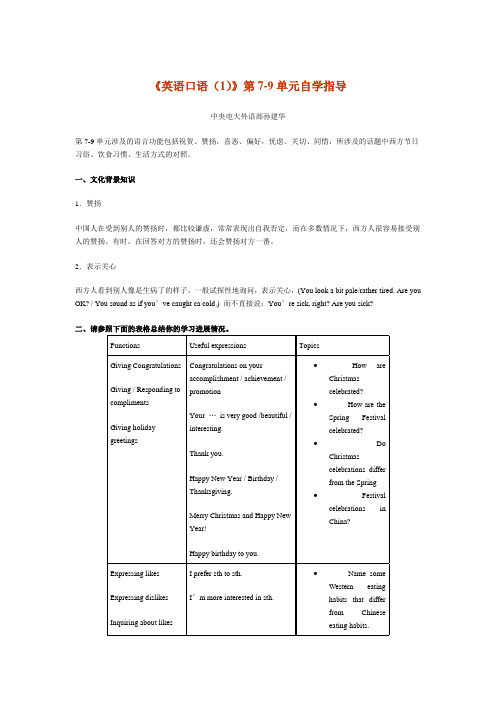
《英语口语(1)》第7-9单元自学指导中央电大外语部孙建华第7-9单元涉及的语言功能包括祝贺、赞扬,喜恶、偏好,忧虑、关切、同情,所涉及的话题中西方节日习俗、饮食习惯、生活方式的对照。
一、文化背景知识1.赞扬中国人在受到别人的赞扬时,都比较谦虚,常常表现出自我否定,而在多数情况下,西方人很容易接受别人的赞扬。
有时,在回答对方的赞扬时,还会赞扬对方一番。
2.表示关心西方人看到别人像是生病了的样子,一般试探性地询问,表示关心,(You look a bit pale/rather tired. Are you OK? / You sound as if you’ve caught ca cold.) 而不直接说:You’re sick, right? Are you sick?二、请参照下面的表格总结你的学习进展情况。
Functions Useful expressions TopicsGiving CongratulationsGiving / Responding to complimentsGiving holiday greetings Congratulations on youraccomplishment / achievement /promotionYour …is very good /beautiful /interesting.Thank you.Happy New Year / Birthday /Thanksgiving.Merry Christmas and Happy NewYear!Happy birthday to you.∙How areChristmascelebrated?∙How are theSpring Festivalcelebrated?∙DoChristmascelebrations differfrom the Spring∙Festivalcelebrations inChina?Expressing likes Expressing dislikes Inquiring about likes I prefer sth to sth.I’m more interested in sth.∙Name someWestern eatinghabits that differfrom Chineseeating habits.and preference I like / love to do sth.I’m fond of sthI’m not keen on sth.I can’t stand sth.I don’t like sth.I don’t care for sth.I’m not interested in sthWould you like to do sth?Would you prefer sth?Do you want to do sth.Would you care for sth? ∙Name some Western tablemanners thatdiffer fromChinese tablemanners.∙What do you enjoy doing inyour spare time?Expressing worry / concern / sympathyInquiring about one’s problem I’m really concerned.I feel very worried.I feel sorry for sth.I’m sorry to hear that…I’m afraid that…What’s wrong?What’s the matter?Is there anything wrong?Is anything the matter?Is there anything I can do foryou?∙How do“good ”healthhabits differ inAmerica andChina?∙How do“bad”healthhabits differ inAmerica andChina?∙List whathabits you thinkmake up theperfectly healthyperson?∙Do youexerciseregularly?三、以口头或笔头方式复习在下列情景中应如何提问/应答:∙Your friend calls you and tells you that he’s just got a good job. What do you say tohim or her?∙You have a report due the next morning, so you have to work late at night. Your roommate usually goes to bed early. What do you say to him / her?∙Suppose your friend is going to take a trip to a famous summer resort. What would you say to him / her when he / she leaves?∙You and your friend would like to eat in a restaurant. You discuss with your friend where to eat, what to eat, etc.∙Your roommate is working very hard on his / her term paper. He / She has had onlya few hours of sleep the past few nights. You are very concerned that he /she will get sickif he/ she does not rest. What would you say to him/ her?四、背景知识阅读Passage 1 The Spring FestivalThe most important festival in China is the Spring Festival. It is a festival to bid farewell to the old year and welcome in the New Year. For many of us, preparations for the New Year begin long before it arrives: houses must be cleaned, and rooms decorated before New Year’s Day. Special scrolls called spring couplets are hung in pairs on walls and doors. Most people shop for new clothes and shoes for the New Year. But the biggest hassle is shopping for holiday food, because it is not just for the New Year’s Eve feast, but also for the first three days of the New Year when most markets and stores are closed.New Year’s Eve is the most important time for the family. Every member is present at the New Year’s Eve feast. Traditional holiday food is served, such as whole chicken symbolizing family reunion and whole fish representing surplus in family income. Usually children get lucky money from their parents and grandparents, which is believed to bring luck to the children.On New Year’s Day, visiting begins. It is traditional for married couples to visit their parents first, and perhaps have lunch or dinner with them. Many people also visit their close friends or relatives in the afternoon. Throughout the holidays, friends and relatives keep coming and going, catching up on what they hadn’t been able to share in the past year. In this sense the Chinese New Year is a festival for family reunion and gathering of friends.But the New Year Festival mainly marks the end of the past year and the beginning of a new one. Firecrackers, for example, are an important part of the New Year celebrations. They explode on New Year’s Eve to scare away the evil spirits and sweep out what is old. It is believed that dragon and lion dances are also performed to ward off evil spirits and bring in wisdom, power and wealth in the year to come.Passage 2 Christmas in AmericaOn December 25—exactly one week before New Year’s Day, Christmas is observed in Christian countries to celebrate the birth of Jesus Christ. If Chinese New Year is the most joyous festival in China, Christmas is the merriest and the most loved holiday in the United States.Like Chinese New Year, Christmas can be felt in the air before the holiday arrives. But preparations fore Christmas are very different from those for the New Year Festival in China. In public squares and on the streets there appears evergreen trees decorated with colored lights and glass balls. Stores are filled with people buying Christmas cards and gifts for families and friends.On Christmas Eve, most families gather around to trim their Christmas trees. After the trees are trimmed and decorated with little ornaments, wrapped gifts are placed under the trees. Young people get together and go out to sing carols in churches and neighborhoods. On Christmas Day, many people participate in church activities in the morning and have family dinner in the evening. Perhaps the most joyful event on Christmas is giving and getting gifts. The legend about this custom says that Santa Claus, an old man, loads the toys into a sled and slides down the chimney of each house to put gifts under Christmas trees or into the stockings which are hung by the children on Christmas Eve. Children wake up early on Christmas Day and open those presents.In fact, the Christmas festival is interwoven with many stories and legends that have been handed down from generation to generation. According to a story, a woman named Mary lived in the town of Nazareth in Palestine. One day in the year 4 BC, an angel came and told her that she would soon give birth to a child. The child would be Jesus Christ, the son of God. After Jesus was born on December 25, his birthday was celebrated and the holiday was called the Mass of Christ, or Christ Mass, which was shortened to Christmas over the years.。
个人英语口语突破指南

个人英语口语突破指南第1章基础语音训练 (3)1.1 元音和辅音的发音技巧 (3)1.1.1 元音发音技巧 (3)1.1.2 辅音发音技巧 (4)1.2 语音连读与语调掌握 (4)1.2.1 语音连读 (4)1.2.2 语调掌握 (4)1.3 发音纠正与口型练习 (4)1.3.1 发音纠正 (5)1.3.2 口型练习 (5)第二章词汇积累策略 (5)2.1 高频口语词汇记忆 (5)2.1.1 收集常用口语词汇 (5)2.1.2 制定记忆计划 (5)2.1.3 运用记忆技巧 (5)2.2 情景词汇学习与应用 (5)2.2.1 划分场景类别 (5)2.2.2 观察与模仿 (6)2.2.3 情景模拟练习 (6)2.3 词汇拓展与同义词替换 (6)2.3.1 查阅词典与词根词缀 (6)2.3.2 学习同义词和反义词 (6)2.3.3 实践与应用 (6)第3章常用句型掌握 (6)3.1 基本句型结构与功能 (6)3.1.1 陈述句(Affirmative Sentences) (6)3.1.2 疑问句(Interrogative Sentences) (6)3.1.3 否定句(Negative Sentences) (6)3.1.4 命令句(Imperative Sentences) (6)3.2 交际用语与情景对话 (7)3.2.1 问候与道别 (7)3.2.2 感谢与道歉 (7)3.2.3 请求与许可 (7)3.3 提问与回答技巧 (7)3.3.1 提问技巧 (7)3.3.2 回答技巧 (7)第4章口语表达地道化 (7)4.1 美国俚语与口语习惯 (7)4.1.1 常用美国俚语 (7)4.1.2 美国口语习惯 (8)4.2 英国俚语与口语习惯 (8)4.2.2 英国口语习惯 (8)4.3 澳大利亚与加拿大口语特点 (8)4.3.1 澳大利亚口语特点 (8)4.3.2 加拿大口语特点 (9)第5章听力训练与模仿 (9)5.1 英语听力材料选择与技巧 (9)5.1.1 材料选择要点 (9)5.1.2 提高听力技巧 (9)5.2 模仿地道发音与语调 (9)5.2.1 发音模仿 (9)5.2.2 语调模仿 (9)5.3 跟读与复述练习 (10)5.3.1 跟读练习 (10)5.3.2 复述练习 (10)第6章口语实战演练 (10)6.1 角色扮演与情景模拟 (10)6.1.1 选择合适的角色和场景 (10)6.1.2 模拟对话练习 (10)6.1.3 角色互换与反思 (10)6.2 口语交流平台与语伴练习 (10)6.2.1 选择合适的口语交流平台 (11)6.2.2 寻找合适的语伴 (11)6.2.3 制定口语练习计划 (11)6.3 英语角活动参与策略 (11)6.3.1 提前准备 (11)6.3.2 大胆开口 (11)6.3.3 积极倾听 (11)6.3.4 主动参与 (11)7.1 Overing Fear and Anxiety (12)7.2 Active Participation and Initiative in Expression (12)7.3 Confident Expression and Charisma Building (12)第8章文化差异适应 (13)8.1 了解西方文化背景 (13)8.1.1 西方历史概览 (13)8.1.2 西方价值观解析 (13)8.1.3 西方教育体制特点 (13)8.2 礼仪与交际习惯 (13)8.2.1 西方礼仪基本原则 (13)8.2.2 面对面交流技巧 (13)8.2.3 电话沟通与邮件礼仪 (13)8.3 跨文化沟通技巧 (13)8.3.1 跨文化沟通的关键要素 (13)8.3.2 非言语交际技巧 (13)8.3.4 避免跨文化交际中的误解与冲突 (13)第9章口语考试应对策略 (13)9.1 常见口语考试类型与要求 (13)9.1.1 面试式 (14)9.1.2 角色扮演 (14)9.1.3 小组讨论 (14)9.1.4 个人陈述 (14)9.1.5 看图说话 (14)9.2 考试技巧与答题策略 (14)9.2.1 预备阶段 (14)9.2.2 答题阶段 (14)9.2.3 注意事项 (14)9.3 考前准备与模拟测试 (15)9.3.1 考前准备 (15)9.3.2 模拟测试 (15)第10章持续进步与拓展 (15)10.1 个性化学习计划制定 (15)10.1.1 分析个人需求 (15)10.1.2 设定学习目标 (15)10.1.3 规划学习时间 (15)10.1.4 安排学习内容 (15)10.2 口语学习资源整合与利用 (15)10.2.1 纸质资源 (16)10.2.2 网络资源 (16)10.2.3 社交平台 (16)10.2.4 实地应用 (16)10.3 口语水平评估与反思改进 (16)10.3.1 口语水平评估 (16)10.3.2 反思与改进 (16)第1章基础语音训练1.1 元音和辅音的发音技巧在学习英语口语的过程中,掌握元音和辅音的发音技巧。
英语口语进阶如何自学

英语口语进阶如何自学英语口语是学习英语的重要组成部分,对于想要提高英语口语水平的人来说,自学是一个有效的方法。
本文将介绍一些英语口语进阶自学的方法和技巧,帮助读者更好地提升自己的口语能力。
建立良好的学习计划在开始自学之前,建立一个合理的学习计划是非常重要的。
首先,确定每天或每周的学习时间,并坚持按照计划进行学习。
其次,制定具体的学习目标,例如每周学习新单词数量、每天练习口语的时间等。
最后,根据自己的实际情况和学习目标,选择适合自己的学习材料和资源。
多听多模仿提高口语能力最重要的一点是多听多模仿。
通过大量听英语原版音频、电影、纪录片等,可以提高对英语语音、语调和表达方式的理解。
同时,模仿母语人士的发音和表达方式,可以帮助培养自己的口语感觉和流利度。
可以选择一些有趣且适合自己水平的英语材料,反复听、模仿,并尝试跟读。
练习口语除了听和模仿,练习口语也是提高口语能力的关键。
可以通过以下几种方式进行口语练习:1. 自我对话在家或者独处的时候,可以尝试进行自我对话。
可以选择一些日常生活中常见的情景,例如购物、旅行等,自己扮演不同的角色进行对话。
这样可以锻炼自己的口语表达能力和思维能力。
2. 参加英语角或语言交流活动参加英语角或者其他语言交流活动是一个很好的机会来练习口语。
在这些活动中,可以与其他人用英语进行交流,分享自己的想法和经验。
通过与他人的互动,可以提高自己的口语流利度和表达能力。
3. 创造真实情境创造真实情境是一个有效的口语练习方法。
可以选择一些日常生活中常见的情景,例如去餐厅点餐、与外国朋友交流等,尽量用英语进行交流。
这样可以帮助自己适应真实的口语环境,并提高口语应对能力。
利用科技资源现代科技为英语口语学习提供了很多便利。
可以利用以下科技资源来辅助自学:1. 在线课程和教学视频有很多免费或付费的在线英语口语课程和教学视频可以选择。
通过这些资源,可以系统地学习口语知识和技巧,并进行模仿和练习。
2. 语音识别软件和应用一些语音识别软件和应用可以帮助纠正口语发音错误。
英语口语入门自学

英语口语入门自学
学习英语口语的入门自学方法如下:
1. 建立学习计划:制定一个合理的学习计划,包括每天/每周
的学习时间和目标。
确保每天都有固定的时间用于学习口语。
2. 多听多读:多听多读能帮助你熟悉英语的发音和语调。
可以通过听英语音频、歌曲、英语电影或者电视剧来提高自己的听力和口语。
3. 大量练习口语:大量的练习是提高口语的关键。
可以和母语为英语的人进行交流,或者找一个语伴进行口语练习。
也可以通过参加英语角等活动来提高口语表达能力。
4. 记录和纠正错误:每次练习口语时,记录下自己常犯的错误,并找到正确的表达方式。
逐步改正发音问题,提高口语流利度。
5. 扩大词汇量:学习新的单词和短语是提高口语的关键。
可以通过背诵单词卡片、使用英语学习App、阅读英文材料等方式来扩大词汇量。
6. 多参与实际对话:通过参与实际对话,如参加英语演讲、辩论或者组织思考时间内的交流等活动,来增强实际应用口语的能力。
7. 保持积极态度:学习口语是一个长期的过程,保持积极的学习态度是很重要的。
要相信自己的进步,不怕犯错误,积极主
动地参与口语练习。
8. 利用网络资源:网络上有很多免费的英语学习资源,如在线课程、学习视频、论坛等。
可以利用这些资源来提升口语水平。
9. 多借助工具:可以使用一些口语练习的工具,如录音机、录音笔、智能手机的录音功能等来记录和回放自己的口语练习,帮助自己更好地改进。
10. 不断练习:最重要的是坚持练习,每天都要找机会进行口
语练习,只有通过实际的实践才能提高口语能力。
初中英语口语练习指南

初中英语口语练习指南在初中阶段,学习英语口语是提高语言能力的关键一步。
就像一位耐心的导师,我们需要为学生们设计一份全面的英语口语练习指南,帮助他们在语言沟通的旅程中获得更多信心和技能。
首先,了解学生们的兴趣和学习风格是至关重要的。
就像倾听一位学生的心声一样,我们可以通过趣味活动和实用的对话练习吸引他们的注意力。
例如,通过角色扮演或模拟真实生活场景,帮助他们理解如何在不同情境下运用所学语言。
其次,激发学生们的自信心和表达欲望同样重要。
作为他们的引导者,我们可以鼓励他们分享自己的想法和观点,无论是在课堂上还是在小组讨论中。
通过提供正面的反馈和建设性的指导,我们能够帮助他们克服语言障碍,流畅地表达自己的思想。
此外,英语口语练习也应该注重语音和语调的准确性。
就像细心的教练一样,我们可以通过模仿和练习重复来帮助学生们提升发音和语音连贯性。
逐步地引导他们正确使用重音和语气,不仅有助于改善口语表达,也能增强交流的效果和效率。
在练习过程中,多样化的学习资源和工具是不可或缺的。
就像提供丰富的学习材料一样,我们可以推荐适合他们水平的听力和口语练习资源。
通过多听多说,不仅可以加深对语言结构的理解,还能增强听力和口语的协调性。
最后,鼓励学生们在日常生活中实践英语口语是巩固学习成果的有效途径。
就像鼓励学生自主学习一样,我们可以建议他们在家庭或社交场合中运用所学,与他人进行简单而自信的对话。
通过持续的实践和反馈,他们能够逐渐提高自己的口语能力,更加流利地表达想法和情感。
总而言之,初中英语口语练习不仅是语言学习的一部分,更是培养学生自信和沟通能力的重要途径。
通过像体贴的导师一样的角色,我们可以为学生们打造一个富有挑战和成就感的学习环境,帮助他们在口语表达中取得实质性的进步。
英语口语学习步骤
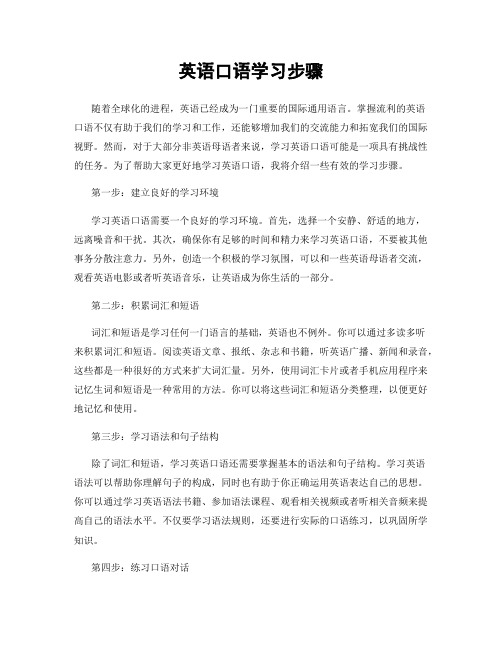
英语口语学习步骤随着全球化的进程,英语已经成为一门重要的国际通用语言。
掌握流利的英语口语不仅有助于我们的学习和工作,还能够增加我们的交流能力和拓宽我们的国际视野。
然而,对于大部分非英语母语者来说,学习英语口语可能是一项具有挑战性的任务。
为了帮助大家更好地学习英语口语,我将介绍一些有效的学习步骤。
第一步:建立良好的学习环境学习英语口语需要一个良好的学习环境。
首先,选择一个安静、舒适的地方,远离噪音和干扰。
其次,确保你有足够的时间和精力来学习英语口语,不要被其他事务分散注意力。
另外,创造一个积极的学习氛围,可以和一些英语母语者交流,观看英语电影或者听英语音乐,让英语成为你生活的一部分。
第二步:积累词汇和短语词汇和短语是学习任何一门语言的基础,英语也不例外。
你可以通过多读多听来积累词汇和短语。
阅读英语文章、报纸、杂志和书籍,听英语广播、新闻和录音,这些都是一种很好的方式来扩大词汇量。
另外,使用词汇卡片或者手机应用程序来记忆生词和短语是一种常用的方法。
你可以将这些词汇和短语分类整理,以便更好地记忆和使用。
第三步:学习语法和句子结构除了词汇和短语,学习英语口语还需要掌握基本的语法和句子结构。
学习英语语法可以帮助你理解句子的构成,同时也有助于你正确运用英语表达自己的思想。
你可以通过学习英语语法书籍、参加语法课程、观看相关视频或者听相关音频来提高自己的语法水平。
不仅要学习语法规则,还要进行实际的口语练习,以巩固所学知识。
第四步:练习口语对话学习英语口语最重要的一步就是进行口语对话练习。
找一个语言伙伴或者参加英语口语班是很好的选择,因为你可以通过与他们对话来提高你的口语能力。
与母语者交流会使你更好地了解他们的语言和文化,并且可以提供实时的纠错和反馈。
另外,你还可以尝试模仿和背诵一些经典的口语对话,这样可以让你更好地掌握常用的口语表达。
第五步:克服语言障碍学习英语口语的过程中,你可能会遇到一些语言障碍,如发音不准确、词汇记忆困难等。
英语口语入门指南

英语口语入门指南1.英语口语入门指南篇一第一步,找一本带有美式口语音频的学习教材。
第二步,将教材的文字内容背熟,然后用手机播放音频,跟踪音频的播放节奏朗读,直到能够与音频的速度不掉一直,口音一致。
第三步,反复练习,实现一边听音频,一边能够默写出视频内容的水平。
第四步,反复依照-背诵-跟读-听写的模式,将教材中的其他课程全部学完。
这是非常重要的一个环节。
你需要进行大量的练习。
当你扎实的完成了这一步,你的口语水平就大大提高了。
2.英语口语入门指南篇二学习口语好的方法是创造一个英语学习环境,很多人学习英语口语是因为他们已经说了很长时间的英语。
如果没有学习英语口语的环境,那就想办法为自己创造这样的环境吧。
例如,你可以看一些美剧,听一些英语歌曲等,看美剧是提高英语口语的好方法。
当然,除了上述方法外,还有以下几种方法:1、录音如果你听不到自己的发音问题,就很难改正。
试着把要说的话录下来,并与以英语为母语的人进行比较,这是处理口语问题是非常有效的。
2、慢慢说很多英语学习者常说,如果说得太快,很容易养成坏习惯。
因为口语考试的禁忌就是太快,太模糊。
所以我们必须准确、流利,每天练习一些基本的语言,从一个音节开始,然后把几个单词组成一个句子,这样你就可以开始慢慢地表达你的想法了。
3、脑补说话的心情闭上眼睛,在你说之前想想怎么发音,想象一下面部动作,这可以与看电影和关注好莱坞明星,如何逐字逐句地说那些迷人的词语结合起来。
4、观察自己发音的嘴型当你发出固定的声音时,站在镜子前,看看嘴巴、嘴唇和舌头的位置。
把它和你看到的母语发音比较一下,通常你也可以用视频来记录你的发音,仔细观察和比较。
3.英语口语入门指南篇三1、自我对话法和别人使用英语交流可能对很多人来说都不是一件容易的事情,尤其是当自己的英语还不好的时候,不敢开口。
自我对话法就是,找一个没人的地方,假设一个场景,一人分饰两角色,把平时学到的好都用上,出声是必须的,越大越好,同时锻炼我们说话时的胆量。
- 1、下载文档前请自行甄别文档内容的完整性,平台不提供额外的编辑、内容补充、找答案等附加服务。
- 2、"仅部分预览"的文档,不可在线预览部分如存在完整性等问题,可反馈申请退款(可完整预览的文档不适用该条件!)。
- 3、如文档侵犯您的权益,请联系客服反馈,我们会尽快为您处理(人工客服工作时间:9:00-18:30)。
《英语口语(1)》第7-9单元自学指导中央电大外语部孙建华第7-9单元涉及的语言功能包括祝贺、赞扬,喜恶、偏好,忧虑、关切、同情,所涉及的话题中西方节日习俗、饮食习惯、生活方式的对照。
一、文化背景知识1.赞扬中国人在受到别人的赞扬时,都比较谦虚,常常表现出自我否定,而在多数情况下,西方人很容易接受别人的赞扬。
有时,在回答对方的赞扬时,还会赞扬对方一番。
2.表示关心西方人看到别人像是生病了的样子,一般试探性地询问,表示关心,(You look a bit pale/rather tired. Are you OK? / You sound as if you’ve caught ca cold.) 而不直接说:You’re sick, right? Are you sick?二、请参照下面的表格总结你的学习进展情况。
Functions Useful expressions TopicsGiving CongratulationsGiving / Responding to complimentsGiving holiday greetings Congratulations on youraccomplishment / achievement /promotionYour …is very good /beautiful /interesting.Thank you.Happy New Year / Birthday /Thanksgiving.Merry Christmas and Happy NewYear!Happy birthday to you.∙How areChristmascelebrated?∙How are theSpring Festivalcelebrated?∙DoChristmascelebrations differfrom the Spring∙Festivalcelebrations inChina?Expressing likes Expressing dislikes Inquiring about likes I prefer sth to sth.I’m more interested in sth.∙Name someWestern eatinghabits that differfrom Chineseeating habits.and preference I like / love to do sth.I’m fond of sthI’m not keen on sth.I can’t stand sth.I don’t like sth.I don’t care for sth.I’m not interested in sthWould you like to do sth?Would you prefer sth?Do you want to do sth.Would you care for sth? ∙Name some Western tablemanners thatdiffer fromChinese tablemanners.∙What do you enjoy doing inyour spare time?Expressing worry / concern / sympathyInquiring about one’s problem I’m really concerned.I feel very worried.I feel sorry for sth.I’m sorry to hear that…I’m afraid that…What’s wrong?What’s the matter?Is there anything wrong?Is anything the matter?Is there anything I can do foryou?∙How do“good ”healthhabits differ inAmerica andChina?∙How do“bad”healthhabits differ inAmerica andChina?∙List whathabits you thinkmake up theperfectly healthyperson?∙Do youexerciseregularly?三、以口头或笔头方式复习在下列情景中应如何提问/应答:∙Your friend calls you and tells you that he’s just got a good job. What do you say tohim or her?∙You have a report due the next morning, so you have to work late at night. Your roommate usually goes to bed early. What do you say to him / her?∙Suppose your friend is going to take a trip to a famous summer resort. What would you say to him / her when he / she leaves?∙You and your friend would like to eat in a restaurant. You discuss with your friend where to eat, what to eat, etc.∙Your roommate is working very hard on his / her term paper. He / She has had onlya few hours of sleep the past few nights. You are very concerned that he /she will get sickif he/ she does not rest. What would you say to him/ her?四、背景知识阅读Passage 1 The Spring FestivalThe most important festival in China is the Spring Festival. It is a festival to bid farewell to the old year and welcome in the New Year. For many of us, preparations for the New Year begin long before it arrives: houses must be cleaned, and rooms decorated before New Year’s Day. Special scrolls called spring couplets are hung in pairs on walls and doors. Most people shop for new clothes and shoes for the New Year. But the biggest hassle is shopping for holiday food, because it is not just for the New Year’s Eve feast, but also for the first three days of the New Year when most markets and stores are closed.New Year’s Eve is the most important time for the family. Every member is present at the New Year’s Eve feast. Traditional holiday food is served, such as whole chicken symbolizing family reunion and whole fish representing surplus in family income. Usually children get lucky money from their parents and grandparents, which is believed to bring luck to the children.On New Year’s Day, visiting begins. It is traditional for married couples to visit their parents first, and perhaps have lunch or dinner with them. Many people also visit their close friends or relatives in the afternoon. Throughout the holidays, friends and relatives keep coming and going, catching up on what they hadn’t been able to share in the past year. In this sense the Chinese New Year is a festival for family reunion and gathering of friends.But the New Year Festival mainly marks the end of the past year and the beginning of a new one. Firecrackers, for example, are an important part of the New Year celebrations. They explode on New Year’s Eve to scare away the evil spirits and sweep out what is old. It is believed that dragon and lion dances are also performed to ward off evil spirits and bring in wisdom, power and wealth in the year to come.Passage 2 Christmas in AmericaOn December 25—exactly one week before New Year’s Day, Christmas is observed in Christian countries to celebrate the birth of Jesus Christ. If Chinese New Year is the most joyous festival in China, Christmas is the merriest and the most loved holiday in the United States.Like Chinese New Year, Christmas can be felt in the air before the holiday arrives. But preparations fore Christmas are very different from those for the New Year Festival in China. In public squares and on the streets there appears evergreen trees decorated with colored lights and glass balls. Stores are filled with people buying Christmas cards and gifts for families and friends.On Christmas Eve, most families gather around to trim their Christmas trees. After the trees are trimmed and decorated with little ornaments, wrapped gifts are placed under the trees. Young people get together and go out to sing carols in churches and neighborhoods. On Christmas Day, many people participate in church activities in the morning and have family dinner in the evening. Perhaps the most joyful event on Christmas is giving and getting gifts. The legend about this custom says that Santa Claus, an old man, loads the toys into a sled and slides down the chimney of each house to put gifts under Christmas trees or into the stockings which are hung by the children on Christmas Eve. Children wake up early on Christmas Day and open those presents.In fact, the Christmas festival is interwoven with many stories and legends that have been handed down from generation to generation. According to a story, a woman named Mary lived in the town of Nazareth in Palestine. One day in the year 4 BC, an angel came and told her that she would soon give birth to a child. The child would be Jesus Christ, the son of God. After Jesus was born on December 25, his birthday was celebrated and the holiday was called the Mass of Christ, or Christ Mass, which was shortened to Christmas over the years.。
